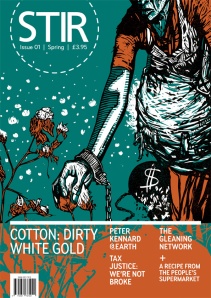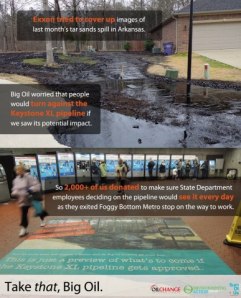
On May 1 the new national grassroots newspaper, Transition Free Press, published its second
summer edition - 24 pages of full colour news and views, contributed by Transitioners and community activists working in the field. Ordinary people doing extraordinary things in all kinds of places: in the city, in the wild, in books, housing co-ops, small businesses, allotments, in the park, down the pub, on the (solar- panelled) roof, underwater, even on the netball court. Front page reports from the US, Greece, Spain, France and Portugal; in-depth features from Sheffield, Louth, Crystal Palace and Lostwithiel.
As printed media struggles financially and the diversity of the world's free press diminishes, small publications like the Transition Free Press are now making their way through the cracks. It's key, the editors feel, that the presses keep rolling and our home-grown news is
physical and visible and goes places that on-line media cannot reach. These shoestring publications provide a vital diversity in a world which is becoming increasingly monopolised and monocultural.
However like CSAs and local businesses everywhere, small publishing ventures need the support and backing of regular customers. These are not mega-corporations with slick marketing operations and big budgets. The team behind the paper is a group of hard-working creative people starting from scratch on the kitchen table. So this 'community-supported media' requires the same generosity and loyalty people show towards community gardens, people's kitchens or food coops.
Good food for the mind and heart

Alongside many Transition projects within a REconomic frame, TFP is a social enterprise, so the paper needs to pay for the work that goes into creating it, as well as printing costs. If the paper were a loaf of bread, you might not question giving £1 for an honest, artisan loaf. So maybe a good way to look at this kind of home-grown comms is to see it as real crafted editorial. Words you can't exactly eat, but neverthless nourish the mind and heart.
While mainstream media are forced to squeeze staff, cut freelance rates and often push a hostile and corporate agenda, the paper looks resiliently and in an earth-friendly way at what is happening in the fields of energy and food, transport and education.
It looks for the big untold narrative under the radar and reports on
how local action is changing the world, the subject of co-founder Rob Hopkins' new book,
The Power of Just Doing Stuff.
The distributors - individuals, Transition Initiatives and local businesses - undertake to buy a bundle, so they can sell the papers and recoup their costs, as well as make some profit to plough back into their own publications. Local groups in Lewes, Bristol, Bungay and other places all create their own newsletters this way to sell alongside the national edition in farmers markets, local shops, cafes, at Transition events and summer festivals.

This is not the only against-the-flow publication to have recently emerged either. Last month also saw the launch of the printed version of the
excellent on-line magazine STIR. TFP's Jay Tompt writes about REconomy in the Transition Network column and editor, Charlotte Du Cann reviews Barbara Kingsolver's novel about climate change and poverty in the Appalachian mountains,
Flight Behaviour. You can find STIR in selected outlets and also, like the Transition Free Press, by subscription.
So if you see a copy do buy one and
pass on the news to a place or a person who might benefit from a liberating read! Leave one in your library or local cafe, or give to a friend or colleague. If you live or work in Norwich,
do get in touch with one of our distributors and put your hands on a real-life copy. If not, you can always
subscribe for a year and receive one through the post.
Meanwhile here is the issue's introduction to whet your appetite:
Welcome to issue two

Energy underpins everything we do in our industrialised societies. The high demand for gas, oil, coal or bio-fuels, as our front page story shows, is now costing the earth on which we depend for life. How we face this dilemma and reduce our need for power is the work of the Transition movement and thousands of community activists around the world.
Most of us are invisible. But, like mycorrhizzal fungi in the living soil, we are connecting and communicating across the globe,
working to bring about a future where people can live fairly within ecological limits.
In our summer edition we publish stories you might not ordinarily see – actions communities undertake to bring back life into neighbourhoods, to activate soils that have been deadened and contaminated, to create new networks that can hold us together in challenging times. An infrastructure you can feel but not always see.
The proposed Keystone XL pipeline threatens to bring toxic crude oil through the heartland of America. Ancient trees fall to make a by-pass in a peaceful valley in Sussex. In response people rise up and take on mighty corporations and rapacious stakeholders.
Sometimes that might is challenged.
We won! wrote TFP columnist, Shaun Chamberlin, as the Ecological Land Co-operative finally secured planning permission for a smallholding in Devon. For a Goliath culture whose top-down business-as-usual worldview requires everyone’s assent, this may appear a small victory. But each time we voice our dissent, each time we reclaim our fields, we realise we are not alone in our task.
Why to do we tell these stories? Because they are sparks that light a great fire inside us. Because another culture is being forged under our feet. In an abandoned warehouse in Doncaster people gather on a freezing night by a furnace to listen to a new narrative being told, along the River Dart a group of children and elders go on a story walk in search of the future. A sunflower garden appears in a neighbourhood in Portalegre. An artist plants 100 fruit trees in a university in Loughborough. In the cities everywhere, leaves appear through the cracks and are gathered by foragers. A dominant worldview does not mean we do not have agency.
What we are not told is that
there is an emergent world inside us. You can find it everywhere where there is warmth and generosity and a co-operative spirit: in community cafes, park libraries, pop-up shops, trade schools, abundance projects, repair cafes, people’s kitchens. It comes in all the colours of the rainbow, it sounds like the nightingale singing in the dark in May. For all people who sing in the dark, who stand by the land, the bird and the tree, who hold the fire until the dawn comes, this paper is for you.
Charlotte Du Cann, Editor
 To order a bundle of Transition Free Press contact mark@transitionfreepress.org.uk
To subscribe for a year click here
Images: front cover of TFP2; community baked bread baked at the squatted Spanish farmhouse,Can Piella, photograph by Phillip Evans; cover of summer issue of STIR; Oil Change International poster (News); sunflower from neighbourhood garden in Portalegre (Profile); TFP button by Trucie Mitchell and Chris Wells
To order a bundle of Transition Free Press contact mark@transitionfreepress.org.uk
To subscribe for a year click here
Images: front cover of TFP2; community baked bread baked at the squatted Spanish farmhouse,Can Piella, photograph by Phillip Evans; cover of summer issue of STIR; Oil Change International poster (News); sunflower from neighbourhood garden in Portalegre (Profile); TFP button by Trucie Mitchell and Chris Wells
 Harper was met with three protests, two outside Parliament and another on top of it as we added British voices to those of Canadian environmentalists and indigenous people whose land would be destroyed by tar sands development. In all, an area the size of England could be laid waste to extract the oil if it is fully developed.
Harper was met with three protests, two outside Parliament and another on top of it as we added British voices to those of Canadian environmentalists and indigenous people whose land would be destroyed by tar sands development. In all, an area the size of England could be laid waste to extract the oil if it is fully developed. I'm highlighting this, not just because it is one of the most critical climate issues we face, but also because of the way it exposes the hypocrisy of our politicians. World leaders have for years signed up to statements of their commitment to preventing dangerous climate change, yet at the same time they apparently have no qualms about supporting developments which would make that threat a reality. George Orwell would recognise this as a classic case of doublethink. Similarly oil companies devote pages of their annual reports to sustainability, while simultaneously following a business plan based on the unsustainable exploitation of fossil fuel reserves.
I'm highlighting this, not just because it is one of the most critical climate issues we face, but also because of the way it exposes the hypocrisy of our politicians. World leaders have for years signed up to statements of their commitment to preventing dangerous climate change, yet at the same time they apparently have no qualms about supporting developments which would make that threat a reality. George Orwell would recognise this as a classic case of doublethink. Similarly oil companies devote pages of their annual reports to sustainability, while simultaneously following a business plan based on the unsustainable exploitation of fossil fuel reserves.













